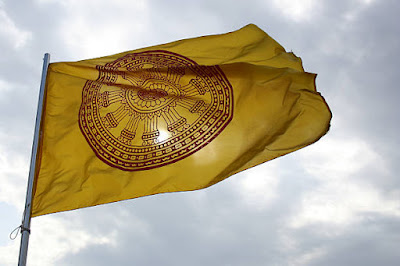The other three purusharthas, or life goals, are artha (money, power, and success), kama (desire), and moksha (liberation).
The notion of dharma is so fundamental to Hindu society that no one English phrase can effectively convey it— potential translations include "religious law," "religious obligation," "duty," "religion," "law," or "social order."
The term dharma is derived from a verb that means "to maintain" or "to uphold."
- Dharma is therefore defined as that which sustains or maintains society, which explains why all of the above translations make sense in this context.
- Dharma provides a general regulatory framework for living in the world, as well as a sense of ultimate purpose to keep one's life in check.
Although Hindu culture encourages the pursuit of both power (artha) and pleasure (kama), it is thought that both will be regulated by an underlying commitment to dharma, which will keep one's life balanced and connected.
The Dharma literature, particularly the Dharma Sutras (aphorisms on religious duty) and Dharma Shastras (treatises on religious duty), was principally concerned with putting down principles for an ordered and harmonious society, and these guidelines take many conceivable aspects into consideration.
Despite the fact that these writings talked of an everlasting (sanatana) dharma and some universal obligations (sadharana dharma) that all humans must do, the most essential thing for every individual was his or her own dharma (svadharma).
Based on one's social standing (varna), period of life (ashrama), and gender (the specific dharma for women was stridharma), one's svadharma offered a well-defined social status and duty.
These books were almost certainly written by brahmin (priest) males
- They tell everything about how they felt things should be, but they are significantly less dependable when it comes to real social behaviors.
- The men who wrote this literature imagined an unequal society in which one's karma (actions), whether good, bad, or mixed, determined one's birth into high or low status groups.
Despite their unequal standing, all groups were required for society to operate peacefully, and ultimate virtue resided in scrupulously completing one's designated social duty.
Doing so dutifully was not only a source of religious merit, but it was also defined as one of the three pathways towards soul liberation, the road of Action, provided one performed one's tasks dispassionately from a feeling of responsibility (karmamarga).
See Pandurang Vaman Kane (trans. ), A History of Dharmasastra, 1968, and K. S. Mathur, “Hindu Values of Life: Karma and Dharma,” in T. N. Madan (ed. ), Religion in India, 1991, for further information.
You may also want to read more about Hinduism here.
Be sure to check out my writings on religion here.



